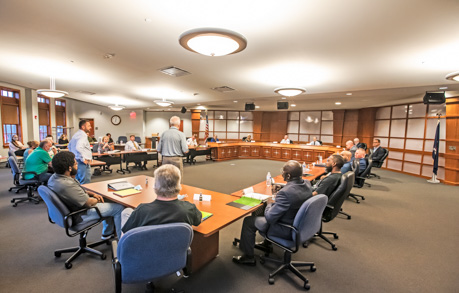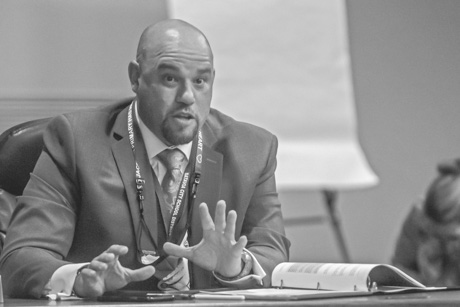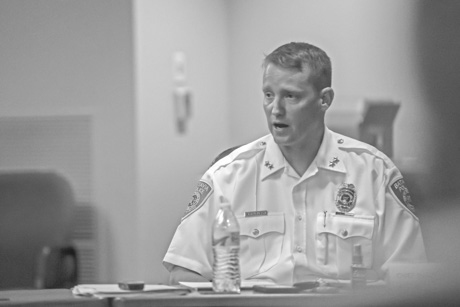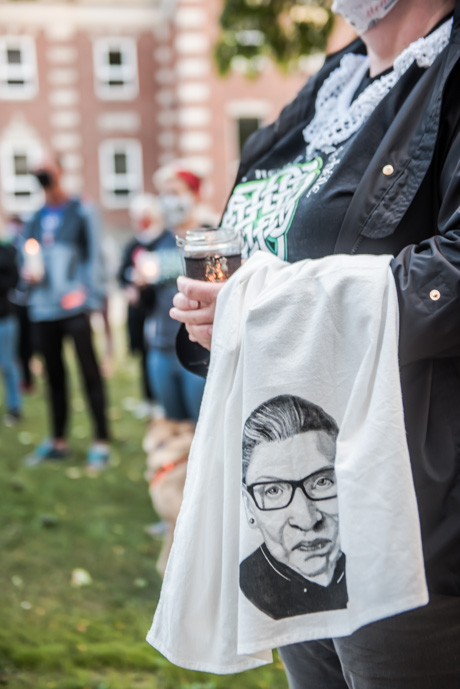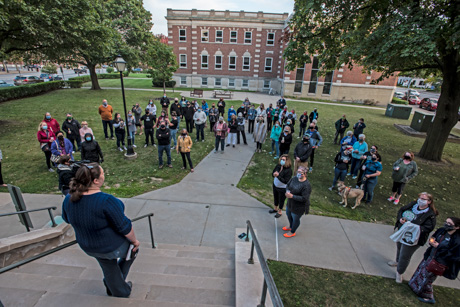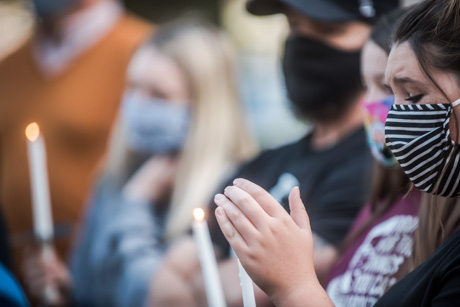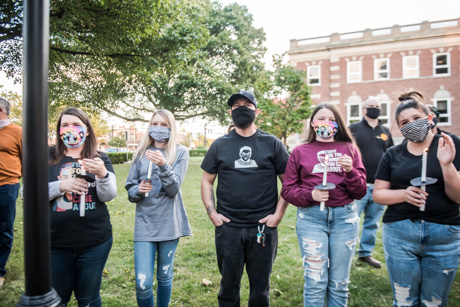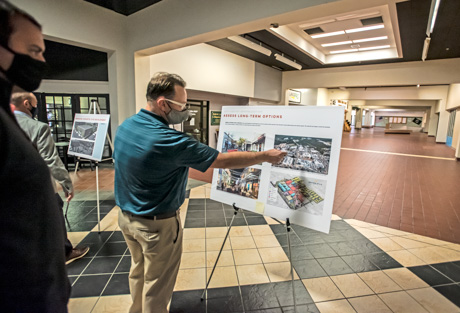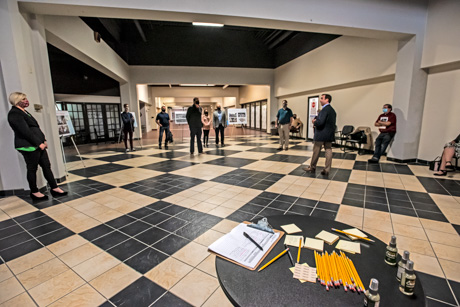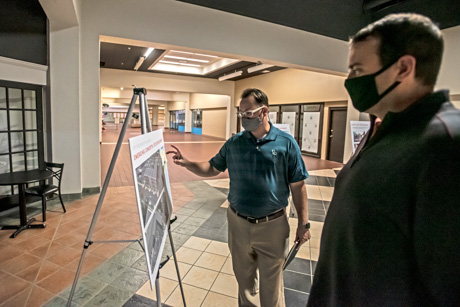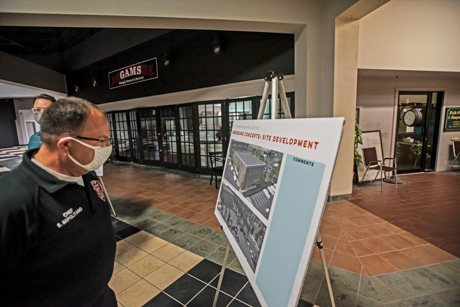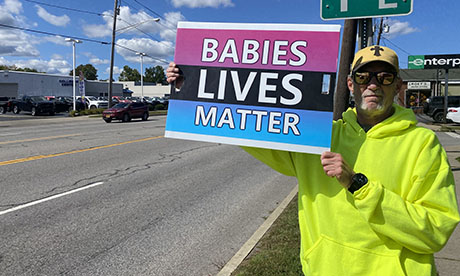The first meeting of Batavia's Police Collaboration Advisory Stakeholder Group was largely informational, with most of the conversation led by Police Chief Shawn Heubusch on the history of policing, police training, and an introduction to the department's use of force policy.
Some members of the group asked questions or offered a short comment.
City Attorney George Van Ness led off the discussion with an overview of Gov. Andrew Cuomo's executive order mandating such review committees -- called "stakeholder groups" -- for all municipalities in the state that operate a police agency.
The group is charged with reviewing all local police policies and procedures and making suggestions for possible revisions. The plan that comes out of the group's work will be forwarded to the City Council. The plan will be subject then to public input and comment. The council will be expected to review and potentially approve the plan. Once certified, the plan will be sent to the state's Office of Management and Budget.
The executive order states municipalities that fail to follow through by April 1 could lose state funding.
For more on the composition of the group, which is comprised of city officials, community members, and subject-area experts, click here.
The Evolution of Policing
Recalling policing's evolution, Heubusch started with officers walking the beat on night patrol in big cities checking that buildings were secure and dealing with vagrants and drunks. Soon, officers took on the job of investigating crimes. Then when cars became common, police officers were charged with traffic enforcement, with a later emphasis catching people driving under the influence of alcohol or narcotics.
In the 1990s, there was a big push for officers to deal with domestic violence, including mandatory arrests in some situations. Modern departments also employ officers to deal with juveniles. In the late 1990s, the war on drugs started and officers put more emphasis on finding people selling or taking drugs and arresting them. Now, officers put more emphasis on getting drug users into rehabilitation.
In Genesee County, police officers assist Genesee Justice with curfew checks.
Community policing has always been a part of a police officer's job, Heubusch said. Since he became chief in 2014, he started a community outreach committee in the department that looks for ways to connect police officers with community members. Programs include shop-with-a-cop, coffee-with-a-cop, and foot patrols.
Police officers also need training in dealing with mental health issues and conflict de-escalation.
More recently, police officers are called on to enforce pandemic-related regulations and quarantine violations.
And nearly all those police activities have corresponding paperwork for the officer to complete.
"That's kind of what modern policing looks like," Heubusch said. "It's a lot. It's one of the reasons going through the academy these says is so long, because there's so much to learn."
Heubusch went through the academy more than 20 years ago when the required training took 600 hours. Now it's 800 hours.
Once an officer graduates from the academy, the officer is required to have 640 hours of field training.
Body Cams, Use of Force Policy, Job-related Stress
A member of the group asked about the use of body cams and Heubusch said since 2014 all officers are required to wear a body cam. Activating the device requires the officer to click a button twice and they are supposed to turn it on for every interaction with citizens with exceptions for emergencies that require quick action from the officer.
Asked if there is an issue with officers forgetting to activate the camera, Heubusch said there have been very few times where the department has needed to investigate a complaint or needed video footage for evidence and supervisors discovered the camera has not been activated.
The discussion then moved to the next agenda item, Batavia's policy on Use of Force (you can read it for yourself on the city's website (pdf)).
While the chief discussed the policy briefly, group members are asked to read it before the next meeting, which will feature an in-depth discussion of the policy.
Heubusch noted that decisions about use of force are often split-second at best and in that time the officer must assess the threat level and what the legally appropriate amount of force is necessary to neutralize the threat.
"They have to use reasonable force given the circumstances right in front of them at that moment in time," Heubusch said.
To help officers be better prepared in stressful situations, they go through from eight to 16 hours of reality-based training every month.
Batavia PD puts officers through more reality-based training than most small police departments, Heubusch said, because the training carries some small risk of officers getting injured since it's a physical activity.
Community member Billy Blackshear asked about stress levels police officers faced and where that factored into training.
Heubusch said in recent years, there's greater awareness about job-related stress in law enforcement. The things they see, the situations they deal with, can take a toll.
"That's one reason 20 years is long enough to be on the job," Heubusch said. "That stuff compounds."
When officers are dealing with stress, either because of something that happened on the job or in their personal life, they are taken off of street patrol, Heubusch said.
The Rigors of the Hiring Process
In response to a group member's comment, Heubusch said because of retirements, the current police office is comprised of nearly half of the officers being hired in the past two years. Some of those officers had prior experience, but the average age of the force now is somewhere around 24 or 25 years old.
YWCA Executive Director Millie Tomidy-Pepper asked if officers are subjected to a background check before being hired. That started a long discussion about how officers are hired.
The state's civil service law will only allow the department to consider the people with the top three scores on the civil service exam.
There are exceptions that allow the department to consider a lower-scoring candidate, such as a candidate withdrawing an application, but those exceptions are few. Only in recent years has a police chief had the option of passing over a candidate who failed a psychological exam.
There is a criminal background check but only a felony conviction is disqualifying.
The candidate must complete a 28-page background check questionnaire.
"You would be surprised how many candidates omit things that they don't think we'll find," Heubusch said.
A detective interviews each candidate. The background check includes contacting former employers and references as well as locating people the candidate didn't name as a reference. The neighborhoods where the officer once lived are canvassed for people who can share relevant information about the candidate. Former spouses and boyfriends or girlfriends are interviewed.
"Anybody we can speak to who can speak to the person's character, we want to talk with them," Heubusch said.
There is a credit history check and a social media check.
Then there is a psychological exam with a specialist in police officer duty in Rochester.
Then a panel interview.
Finally, the candidate must take a polygraph.
"If you don't pass the polygraph, you don't get a job offer," Heubusch said.
The whole process takes several weeks.
Victor Thomas, a community member and representative of Just Kings Social Club, said, "That sounds like a lot. It seems you almost have to be perfect to get a job." Then he got a laugh when he said, "I think you just explained to me why I didn't get in."
Heubusch said, "we're not looking for perfect people. We all have skeletons in our closets. What we're looking for are major issues."
The big problem with the process, Heubusch said, is the state law mandating the department to only consider the top three candidates from the civil service exam. There are often better candidates, including some from our local community, who are not among the top three scorers. He would like to see New York go to a system, like some other states, where the exam is "pass/fail," which would mean, perhaps, if 200 people took the exam, the police department could consider up to 100 candidates, including local candidates.
Community member Michael Henry asked if officers receive cultural awareness training. Heubusch said they do in the academy but he didn't have the curriculum with him.
Anibal Soler Jr., superintendent of Batavia City School District, noted that in none of the material provided to group members nor during the presentation was the issue of race mentioned and he suggested a discussion of race be included in any policy reform, training, and in hiring practices.
City Church Pastor Marty Macdonald took exception to a comment by Heubusch that suggested past behavior was predictive of how a person might do as a police officer. He spoke at length about the ability of people grow, learn and reform.
Heubusch said he agreed and said his comment was meant to refer to references from former employers.
Blackshear commended the chief for his foresight, mentioning he met with Heubusch some years ago, in addressing community issues and trying to reach young people, including trying to recruit young people to a career in law enforcement.
Beyond Diversity -- Doing the Job Correctly with Accountability
Brandon Armstrong, a small business owner and also a member of Just Kings, said he was going to bring up what he thought would be an unpopular opinion: That the big issue was not the diversity of police departments, but the inability of police departments or the justice system to punish police officers who don't do their job the right way. He noted that there have been black police officers accused of acting just as bad as white police officers in other jurisdictions.
"We do need diversity but if somebody isn't doing the job right, they need to better held accountable for it," Armstrong said. "I don't care what color they are."
The opinion wasn't unpopular at all. Other group members said they agreed and nobody disagreed.
Anibal Soler Jr.
Shawn Heubusch
Video Sponsor
.pane-node-body img {background: none !important; border: 0 !important; margin: 0 !important; padding: unset !important; padding-left: 1px !important }
broadstreet.zone(69076)



